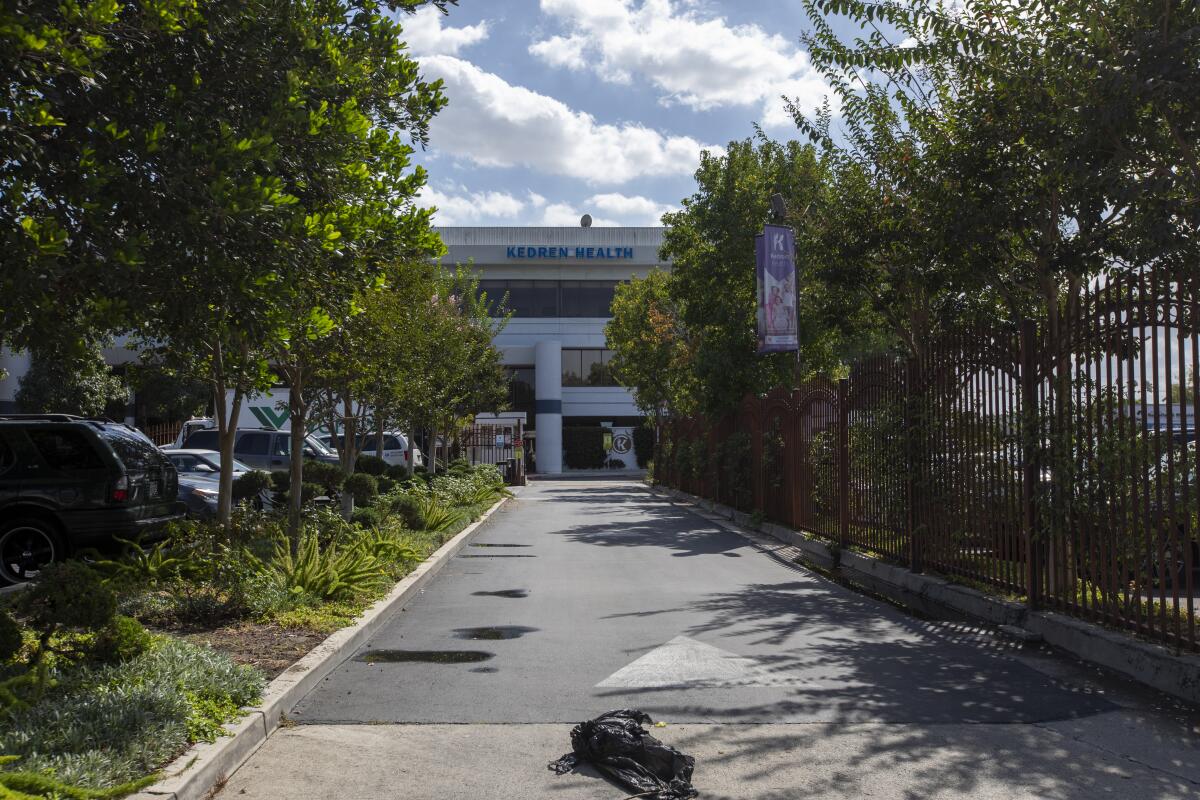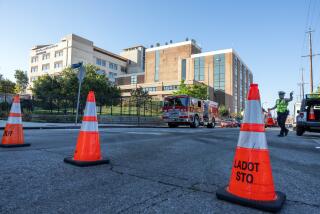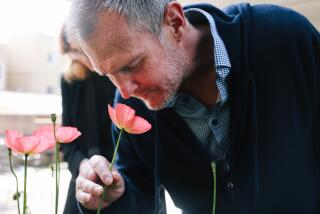Killing of patient, allegations of dangerous care haunt South L.A. psychiatric hospital, investigation finds

Jacob Masters had been drifting around Southern California for months when he began suffering a mental breakdown.
On Oct. 27, 2017, Redondo Beach police took him to the Kedren Community Health Center in South Los Angeles, where he was placed on an involuntary hold.
He would never leave.
A week into his stay, Masters was strangled in his room. Another patient — psychotic and suicidal, according to hospital records — has been charged with murder.
Government inspectors later discovered that the hospital had failed to monitor Masters’ room and that his alleged assailant, who’d been brought to the facility after attempting suicide, was never given a psychiatric evaluation.
A Times review of inspection reports and court records has revealed serious failures of oversight in the care of patients at Kedren’s acute psychiatric hospital, a key resource for people struggling with mental illness.
Among the cases: One patient reported being choked by a Kedren employee. Another said she had been sexually assaulted by her roommate. There was no evidence the hospital investigated either complaint, according to state inspectors.
In recent years, several former employees have alleged in lawsuits that they were fired for reporting serious misconduct and dangerous practices at the hospital.
The claims have focused scrutiny on a historic institution founded in the ashes of the Watts riots, which for more than 50 years has been a mainstay of mental health, primary care, education and other family services.
The inspection in the wake of Masters’ death found widespread safety issues at the hospital that put patients in “immediate jeopardy” of harm or death.

Of the nearly 800 similar inspections conducted at psychiatric hospitals across the nation last year, that level of violation was found only 28 times, according to the Centers for Medicare and Medicaid, the administrator of the federal healthcare programs.
State, local and federal regulators say that Kedren has carried out numerous reforms and is capable of providing quality care to its patients. Since the July 2018 inspection, the hospital has added 24-hour psychiatric coverage, appointed a medical director of inpatient psychiatry and installed new software systems to track patients and reports of safety violations.
In March, Kedren’s federal certification was renewed.
A spokesperson for the California Department of Public Health confirmed that “the facility is back in compliance with both state and federal requirements.”
Brian Kamel, the hospital’s attorney, said in an emailed statement: “Kedren has had an outstanding history over the [last] approximate 52 years of providing mental health services to an under-served, underprivileged, and diverse community in Los Angeles.”
But records reviewed by The Times raise significant questions about the hospital’s operations and show that Kedren’s leadership was slow to react when made aware of safety concerns.
Two weeks after Masters’ death, the hospital’s board of directors met to review the incident. They suggested a psychiatrist be present in the evenings to immediately evaluate and treat patients admitted after-hours, according to meeting minutes obtained by federal inspectors.
But eight months after the board’s recommendation, inspectors learned, the hospital still had no after-hours psychiatrist on duty.
Inspectors found that the hospital’s chief executive and president at the time, Dr. John Griffith, had not reviewed an internal postmortem report of the incident, which itself was undated and vague. The report included no mention of the lack of psychiatric evaluations or patient monitoring and gave no recommendations. When interviewed, Griffith told the inspectors, “Things could have been managed much better.”
More than a year after Masters’ death, a patient, who hadn’t been seen by a doctor, broke a toilet and attacked a security guard with one of the shards, according to a follow-up survey.
Only then did Kedren implement round-the-clock full psychiatric clinical care, the survey stated.
Griffith is still the facility’s president. Neither he nor Yolanda Whittington, the hospital’s new CEO, responded to requests for comment.
“Everything was done properly,” Kamel said in response to questions about Masters’ death.
Violence in psychiatric hospitals is not uncommon. The California Department of State Hospitals, which runs five such facilities across the state for people ordered into treatment by a court, reported more than 3,500 incidents of patient-on-patient violence in 2017 and an additional 3,300 involving staff.
But experts say that hospital homicides are rare and that the allegations surrounding Masters’ death are extraordinary.
“If accurate, it’s a shocking deviation from ordinary standards of practice,” said Dr. Steven Hoge, director of the Forensic Psychiatry Fellowship Program at Columbia University, referring to the hospital’s failure to evaluate and monitor Masters’ alleged assailant.
Kedren was founded by a group of black psychiatrists in the wake of the 1965 Watts riots to address the poverty, discrimination, violence and education gaps that underpinned much of the unrest — and that are still prevalent.
Over the years Kedren has expanded its outpatient programs while adding beds to the hospital. Funded primarily by Los Angeles County, the nonprofit provides mental health care to nearly 14,000 people. According to a 2018 financial report, its operating budget is some $39 million.
The vast majority of the hospital’s patients are, like Masters, detained under a California law that allows people with severe mental illness to be involuntarily committed to a psychiatric hospital if they are a danger to themselves, a danger to others, or “gravely disabled.”
Harold Turner, director of programs at the Urban Los Angeles chapter of the National Alliance on Mental Illness, said Kedren’s problems are part of a mental health crisis that extends well beyond the facility. He cited a lack of resources, psychiatrists and accountability in the mental health system.
Los Angeles has 23 psychiatric beds per 100,000 people, less than half of the 50 recommended by experts, according to a report released earlier this year by the California Hospital Assn.
“You have a recipe for this type of disaster,” Turner said.
But Dr. David Ruskin, who was chief psychiatrist at the county’s Department of Mental Health during the inspections, said he believes the hospital has addressed the issues that led to Masters’ death.
“If, God forbid, one of my family members got sick, I would be comfortable having them go to Kedren,” said Ruskin, who left the department in August.
The hospital has been the focus of retaliation claims by several former employees in recent years. In one 2016 case that led to out-of-court mediation, a nurse alleged that she was fired after reporting insurance fraud and a lack of basic safety training.
And in a pending lawsuit, Brenda Hilliard alleged she was fired in April 2017 after reporting to a supervisor that a 12-year-old patient had been given medication without a prescription. A nurse with 34 years of experience, Hilliard alleged that nurses would routinely administer medication without consulting a doctor. Doctors would sign documentation the next day, making it seem that they had issued verbal orders for the medication, according to her lawsuit.
Kedren has denied each of these allegations in legal filings.
Seven months after Hilliard was fired, police brought Masters to Kedren. He had left Oklahoma on a bus for California several months earlier on the eve of his 30th birthday, telling his mother he wanted to see the ocean.
It’s unclear what led to Masters’ encounter with law enforcement, though the Redondo Beach Police Department confirmed that he was found at the city’s public library. Masters was brought to Kedren and diagnosed with psychosis, according to hospital records reviewed by inspectors.
He had been there a week when 41-year-old Francisco Garcia was admitted to the hospital and bunked beside him. Garcia had attempted to cut himself with a knife and was psychotic and a danger to himself, according to hospital records reviewed by inspectors. But Garcia was never seen by a doctor or given psychiatric medication, according to the inspection report.
Six hours after Garcia’s admission, on the night of Nov. 2, 2017, staff members responded to a disturbance in the hallway outside Masters’ room between Garcia and a third roommate, a nurse told inspectors. The roommate told the nurse that Garcia had killed Masters and was trying to kill him too.
A bloodied Masters was found unresponsive, staff told inspectors. After attempts to resuscitate him failed, Masters was pronounced dead.
The inspection reports do not refer to Garcia by name. But he was arrested in connection with the killing and currently awaits trial. He has pleaded not guilty.
In another pending lawsuit, filed late last year, a hospital employee alleges he reviewed security footage from that night and found that Masters’ room was unattended for nearly three hours. The employee, Shahrooz Shahram, was the hospital’s director of quality improvement.
Shahram’s lawsuit alleges that Griffith was furious when he learned Shahram was investigating Masters’ death and prevented him from meeting with county inspectors. A month after the killing, Shahram alleges, his office was ransacked and documents from the case went missing. His lawsuit claims that Griffith fired him in January, telling him he “was ‘creating too many problems.’”
Shahram also alleges that records at the hospital were routinely forged and that it was “routine practice to mistreat patients to the degree of abuse and neglect.” The lawsuit describes an employee who threw a patient against a wall, leaving a dent. That same employee, the lawsuit claims, had been accused of engaging in sex with a patient and the accusation was never investigated.
Inspectors confirmed reports of assaults that appeared never to have been investigated.
Kedren has denied Shahram’s allegations.
The hospital reported Masters’ death to the California Department of Public Health, which conducted a six-month investigation. It found that the hospital had violated state regulations in failing to adequately assess and monitor Garcia.
According to the hospital’s chief of nursing, Garcia “should have been placed on constant observation” because he had recently attempted suicide, investigators wrote in their report.
Surveillance footage reviewed by inspectors showed no staff member entering the room between 8:45 p.m. and 9:15 p.m., shortly before Masters was found. The chief of nursing confirmed to investigators that the room appeared unsupervised during that period.
In late July 2018, state and federal inspectors returned unannounced to the hospital. This time, they inspected the entire facility for compliance with federal regulations on behalf of the Centers for Medicare and Medicaid.
In addition to confirming lapses in Kedren’s care of Masters and his roommates, this inspection uncovered other problems.
Inspectors discovered that neither the hospital’s director of food services nor its infection control officer were formally trained for their roles; only two of the 10 food handlers were certified, in violation of the law.
After declaring an emergency due to the “potential to cause food-borne illness including death to all 33 patients and staff,” the inspector intervened and stopped reheated leftover chicken from being served, the report said.
Masters’ family has filed a wrongful-death lawsuit, accusing the hospital of negligence for failing to monitor and evaluate his alleged attacker.
“There’s credible evidence that Kedren did not monitor the room that Masters was in for an extended period of time, which violates their own policy and violates state law,” said Brian Claypool, a Los Angeles civil rights lawyer representing the family.
Although Kedren has yet to respond to the legal complaint filed by Masters’ family, its lawyer said it intends to deny all of the allegations, just as it has done in each of the other lawsuits.
“Every case has two sides,” Kamel wrote in the email.
Growing up in Kansas, Masters dreamed of becoming a veterinarian, his mother, Melody Burkholder, said. But he struggled with bipolar disorder and eventually dropped out of high school. Medication eased his symptoms, but Masters was frequently hospitalized after neglecting to take it.
After Masters left for California, he stayed in touch with Burkholder on Facebook and told her he was enjoying the beach and making new friends. But by the end of October 2017 his mental state had deteriorated. He was homeless and in the midst of a manic episode when he arrived at Kedren, according to a nurse at the hospital.
When Burkholder first heard of her son’s death, she was in disbelief. “The one place he thought would keep him safe turned out to be the one place on the planet where he was not,” she said.
“It cost him his life,” she said. “And it cost me my son.”
More to Read
Start your day right
Sign up for Essential California for news, features and recommendations from the L.A. Times and beyond in your inbox six days a week.
You may occasionally receive promotional content from the Los Angeles Times.






